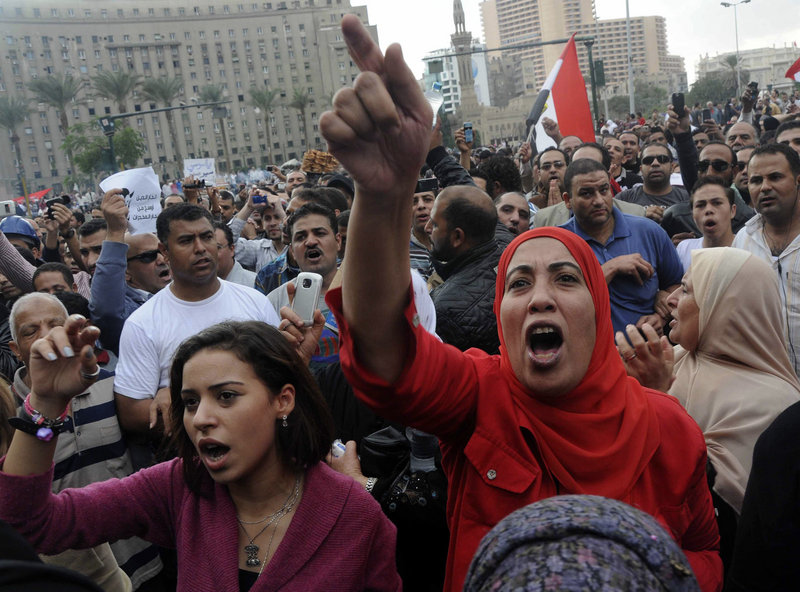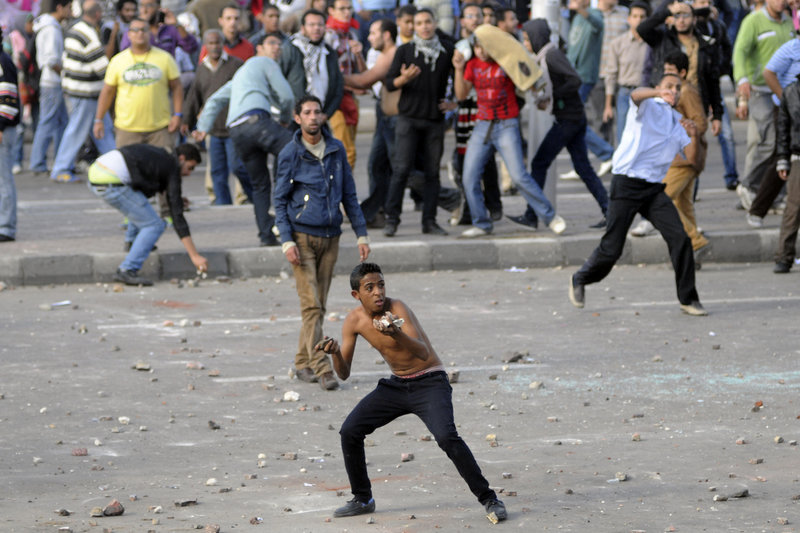CAIRO – Clashes erupted across Egypt over President Mohammed Morsi’s decree expanding his authority, a move that sharpened lines between Islamists and those who fear the president is stealing power to edge the country closer to Islamic law.
Offices of the Muslim Brotherhood’s Freedom and Justice Party, of which Morsi is a leading member, were set ablaze Friday in Alexandria and reportedly in Suez and Port Said. Pro- and anti-Morsi demonstrators battled in Cairo and towns in the south, a result of Egypt’s increasing polarization amid its troubled transition to democracy since last year’s revolution.
The unrest highlighted the anger over Morsi’s decision Thursday to sidestep the courts and free his office of judicial oversight. With no new constitution or parliament, the president holds wide executive and legislative authority that has led his detractors to call him a pharaoh.
Morsi’s decree troubled Western capitals, including Washington, which praised him this week for Egypt’s pivotal role in negotiating a cease-fire between Hamas and Israel in the Gaza Strip. State Department spokeswoman Victoria Nuland said Morsi’s recent move “raises concerns for many Egyptians and the international community.”
The Egyptian government news agency reported that at least 140 people were injured in melees. As night fell, plumes of smoke and streaks of tear gas drifted over several cities as protesters hunkered down and new banners were unfurled in what felt like the stirrings of a new revolt. Twenty-six political movements called for a weeklong sit-in in Cairo’s Tahrir Square.
“Morsi is ignorant; he will burn down the country,” protesters chanted in the square.
Riot police swinging batons chased rock-throwing youths on side streets adjoining Tahrir, where thousands of protesters gathered, led by Nobel Peace Prize laureate Mohamed ElBaradei and other opposition leaders. Miles away in north Cairo, thousands of members of the Brotherhood and other Morsi supporters demonstrated at the presidential palace.
“What I am working to achieve is political and economic stability. This is what I want,” Morsi told followers at the palace. “I am not worried about the presence of opposition. I am careful to allow a strong opposition that will strictly monitor me. My decisions were aimed at preserving our nation, our people and the revolution.”
Morsi, who was elected after former President Hosni Mubarak was overthrown last year, is seeking to weaken the courts and sideline Mubarak-era judges he claims have disrupted the transition to democracy. The Supreme Constitutional Court this year dissolved the Islamist-led parliament and has been reviewing a case that could result in the assembly drafting a new constitution being disbanded.
That body, which is expected to deliver a finished document in December, is also dominated by Islamists. Morsi’s decree essentially grants it immunity from court decisions, infuriating secularists, liberals and Christians who have resigned from the assembly in recent weeks over accusations that it is too heavily influenced by sharia, or Islamic law.
“I don’t like, and don’t want, and there is no need, to use exceptional measures,” Morsi said.
The president tried to make his decree palatable by firing Prosecutor-General Abdel Meguid Mahmoud, a Mubarak appointee who has been widely reviled for not aggressively prosecuting members of the old regime. Mahmoud, who Morsi tried unsuccessfully to remove last month, told Egyptian media Friday that he would fight the decision.
The president did not win over protesters in Tahrir.
“The state is crumbling. The law is being completely sidestepped. We are now a lawless country,” said Nermin Tahoon, a protester in Tahrir. “Morsi disguised the revolution’s demands into a twisted package so he could assume all power. Since when was he a revolutionary? He’s barely a reformist. He simply wants power for him and his followers.”
The deepening political divisions come amid a sense of rage and disillusionment that the country is not moving forward after the uprising that toppled Mubarak. The mood has been further soured by pervasive social and economic problems that have strained Morsi’s inexperienced government, even as he emerged as a hero of sorts over the Hamas-Israel cease-fire deal.
Egypt is seeking billions of dollars in foreign investment, but months of turmoil have not helped its case. Morsi has long claimed the mantle as one of the revolution’s leaders, but these days he is regarded by activists and liberals as possessing the same urge for political dominance as Mubarak.
Send questions/comments to the editors.




Success. Please wait for the page to reload. If the page does not reload within 5 seconds, please refresh the page.
Enter your email and password to access comments.
Hi, to comment on stories you must . This profile is in addition to your subscription and website login.
Already have a commenting profile? .
Invalid username/password.
Please check your email to confirm and complete your registration.
Only subscribers are eligible to post comments. Please subscribe or login first for digital access. Here’s why.
Use the form below to reset your password. When you've submitted your account email, we will send an email with a reset code.